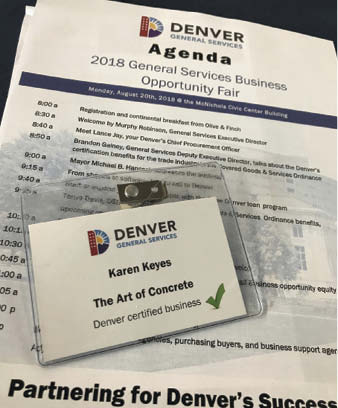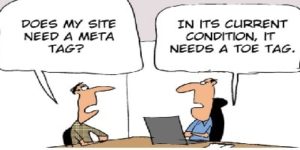
Having operated my own business for one year already, I’ve learned that being a start-up has many, many challenges. However, one thing we have in our favor right now is that we qualified to be certified as a DBE (Disadvantaged Business Enterprise), EBE (Emerging Business Enterprise), SBE (Small Business Enterprise) and M/WBE (Minority/Women Business Enterprise).
We’re currently certified with CDOT (Colorado Department of Transportation), the city of Denver, the federal government, WYDOT (Wyoming Department of Transportation) and consequently the state of Wyoming. It’s a bit of an invasive process to become certified, but well worth the time. At press time, I’m meeting with professionals to entertain the idea of pursuing 8a SBE to help pursue more set-aside federal work geared for small businesses.
If you’ve been wondering if it’s worthwhile to become a certified firm, let me present some details to you. The process to become certified varies from state to state, so be sure to check with your local jurisdiction.
In comparison, the federal process is simple and is a self-certifying process done through the sam.gov website. At the bare minimum, I recommend getting this certification if you qualify.
The information that follows is based on my experience in Denver. Each city or state will have its own rules, but I hope the information helps you decide if it’s something you want to pursue further in your region.

Proof is needed
I sit on the Diversity Council of my local Associated General Contractors of America chapter to help embrace a more diverse workforce. One of the misconceptions I frequently hear is that certified firms aren’t qualified to do the work or aren’t interested in the work. This isn’t true.
To become certified in the category of work you want to perform, you need to prove you have the equipment and capability to do the work. This is done via the application process and a personal office visit interview by the city and county of Denver.
A company also must renew every year to ensure it’s still in business, still qualifies to be certified and is performing the scope of its certification. It is quite the process to become certified, so I find it hard to believe any small business would go through the steps of becoming certified if it wasn’t interested in the work.
Certification parameters
To qualify to be certified, 51 percent or more of the company must be owned by one of the classes you are applying for (i.e., minority, disadvantaged, woman). Below are the requirements of four of the certifications in Denver:
DBE – This certification is based on race and/or gender (Woman, Mexican, Native American, Asian or Black). If you can get M/WBE status, chances are you can get the DBE certification. As a company, your annual revenue maximum averaged over three years must be less than $23.98 million. As an owner, your personal net worth must be less than $1.32 million. You also must have been in business for at least one day and be registered with the state.
M/WBE – This certification has the same requirement as the DBE. The only differences are the application fee (it’s waived for DBE, but $200 is required if you apply for the M/WBE) and the category of work (DBE is broader and M/WBE is more construction focused). You must be in business for at least six months before applying for the M/WBE.
SBE – This certification has the same company revenue and personal net worth thresholds as above. However, there is no requirement for gender or race. You also must be in business for a minimum of six months to apply.
EBE – For this certification, again, you must be in operation for six months and have the same personal net worth threshold as above. However, the annual revenue for the company is dropped to a maximum of $3 million average. EBE is also race-gender neutral.
Apply for all together
In Denver, the application process for all these certifications is the same and goes through the same entity. So ideally, you apply for all four certifications together and pay the application fee once rather than doing them all at separate times. The only advantage I see to filing separately is to get your DBE status before your company is six months old. Otherwise, I recommend doing them all at the same time.
The process is more invasive than a general contractor’s prequalification process. They will ask you all about your personal finances along with the ins and outs of the business. You have to show them all your books and have notarized forms ensuring everything is honest and accurate.
Once the application is in, the certifying agency reviews it. In Denver, they then follow up with an on-site interview at your office to verify all the information. They’ll interview you, and maybe your employees, to ensure you’re set up to do the work you say you do. It’s a very thorough process.
Worth the effort
Now that my company is certified in all of the above and my renewal period is coming up soon, I find being certified well worth the effort. I will renew all my certifications.
Many projects are mandated by law to use a certain percentage of disadvantaged businesses. And, because certified firms are generally newer, the turnover of these firms is high, so general contractors are constantly in search of current certified firms they can use.
If you prove to be a reliable and stable firm that general contractors can turn to when required, chances are they’ll continue to turn to you with or without a DBE requirement. But, because of the misconception out there that certified small businesses aren’t reliable, you’ll need to overcome that obstacle and prove that you are.
No guarantees but…
Most of my calls for leads come from the local level. However, because I certified in Colorado, WYDOT contacted me to become certified in Wyoming as well because it needs certified contractors.
One thing the agent assigned to my application wanted to make sure I understood was that becoming certified doesn’t guarantee the phone will ring. His point is you still need to market and network to get your name out there.
I can’t stress enough how important marketing is, even though I’ve been invited to look at several jobs solely because my company is on Denver’s website as a certified firm. And, without being certified in Colorado, Wyoming would have never called me to be on its list.
Being certified won’t sell the jobs for you, but it will give you opportunities you may not have had otherwise.
















